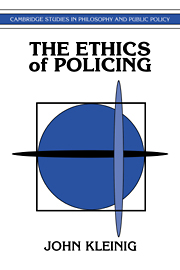2 - Moral foundations of policing
Published online by Cambridge University Press: 05 June 2012
Summary
Police are occupied with peacekeeping – but preoccupied with crime fighting.
Jesse RubinAs long as human societies have existed, the police function has been needed. Social coordination and harmony have never flourished without some form of executive authority. Sometimes the executive task has been shared among many; at other times, and increasingly with the division of social labor, it has devolved upon selected individuals, organized and coordinated to provide that service effectively and efficiently. What we now most generally refer to as policing usually dates itself from the formation, in 1829, of the London Metropolitan Police, a legislatively mandated organization designed to provide round-the-clock service to a community confronted by diverse needs and fears. The “principal object” of the Metropolitan Police was “the Prevention of Crime,” and although, along with the detection and conviction of offenders, this has ever since been the central and distinctive concern of police organizations, it is clear even from the first instruction manual that police were expected to have a much wider social role as “problem busters” or “crisis managers.”
On what moral basis can we justify the existence of an organization with the powers customarily vested in police? By what morally preferable alternative means might we contemplate the provision of police services? How widely should police authority and responsibility be permitted to extend? It is to these general questions of political morality that the present chapter is directed.
- Type
- Chapter
- Information
- The Ethics of Policing , pp. 11 - 29Publisher: Cambridge University PressPrint publication year: 1996

